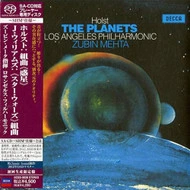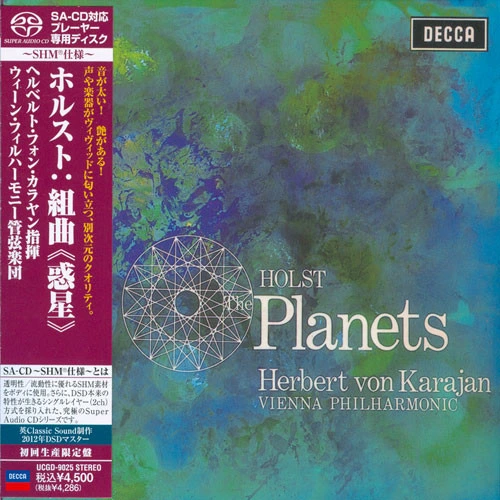Includes Selections from John Williams' Star Wars Film Score!
This item not eligible for any further discount offers!
This disc will ONLY work on a Super Audio Disc Player!
 SHM-SACD (Super High Material SACD) is the ultimate Super Audio CD that utilizes the materials and technologies that were developed for the SHM-CD to further enhance the audio-resolution. These discs are made with polycarbonate developed for the screen of the liquid crystal display. As it has a higher transparency, players can read the signal more faithfully. Also, it excels in fluidity, which enables you to cast a more accurate pit. What works wonders for a low resolution format such as CD should offer even greater sonic improvements in a real high resolution format such as SACD.
SHM-SACD (Super High Material SACD) is the ultimate Super Audio CD that utilizes the materials and technologies that were developed for the SHM-CD to further enhance the audio-resolution. These discs are made with polycarbonate developed for the screen of the liquid crystal display. As it has a higher transparency, players can read the signal more faithfully. Also, it excels in fluidity, which enables you to cast a more accurate pit. What works wonders for a low resolution format such as CD should offer even greater sonic improvements in a real high resolution format such as SACD.
The Planets, Op. 32, is a seven-movement orchestral suite by the English composer Gustav Holst, written between 1914 and 1916. Each movement of the suite is named after a planet of the Solar System and its corresponding astrological character as defined by Holst. With the exception of Earth (the centre of all yet influentially inert astrologically), all the astrological planets known during the work's composition are represented.From its premiere to the present day, the suite has been enduringly popular, influential, widely performed and frequently recorded.
The concept of the work is astrological rather than astronomical (which is why Earth is not included): each movement is intended to convey ideas and emotions associated with the influence of the planets on the psyche, not the Roman deities. The idea of the work was suggested to Holst by Clifford Bax, who introduced him to astrology when the two were part of a small group of English artists holidaying in Majorca in the spring of 1913; Holst became quite a devotee of the subject, and liked to cast his friends' horoscopes for fun. Holst also used Alan Leo's book "What is a Horoscope?" as a springboard for his own ideas, as well as for the subtitles (i.e., "The Bringer of...") for the movements.
Zubin Mehta's list of awards and honours is extensive and includes the "Nikisch-Ring" bequeathed to him by Karl Böhm. He is an honorary citizen of both Florence and Tel Aviv and was made an honorary member of the Vienna State Opera in 1997, of the Bavarian State Opera in 2006 and of the Gesellschaft der Musikfreunde Wien in 2007. The title of Honorary Conductor was bestowed to him by the following orchestras: Vienna Philharmonic Orchestra (2001), Munich Philharmonic Orchestra (2004), Los Angeles Philharmonic (2006), Teatro del Maggio Musicale Fiorentino (2006), Bavarian State Orchestra (2006). In October 2008 Zubin Mehta was honoured by the Japanese Imperial Family with the Praemium Imperiale. In March 2011 Mo. Mehta received a special distinction, in getting a star on the Hollywood Boulevard. The Commanders Cross of the Order of Merit of the Federal Republic of Germany was bestowed to him in July 2012.
Features:
SHM-SACD
2-channel Single Layer SACD
Two-channel SACD layer only, to secure enough reflectance and not to compress DSD file.
Label of the disc is printed with a special green ink called 'Onsho Shiyou,' which minimizes diffuse reflection.
Carefully selected master audio is used, from existing DSD files to newly converted from analog tapes.
This disc will ONLY work on a Super Audio Disc Player
Musicians:
Los Angeles Philharmonic Orchestra
Zubin Mehta, conductor
Selections:
Gustav Holst (1874 - 1934)
1. Mars, the Bringer of War
2. Venus, the Bringer of Peace
3. Mercury, the Winged Messenger
4. Jupiter, the Bringer of Jollity
5. Saturn, the Bringer of Old Age
6. Uranus, the Magician
7. Neptune, the Mystic
John Williams (1932 - )
8. Main Title from Star Wars, Episode IV: A New Hope
9. Princess Leia Theme Song
10. Little People
11. Tavern Band
12. Fight Song
13. Between the Throne/Title Song
This item not eligible for any further discount offers!
This disc will ONLY work on a Super Audio Disc Player!
 SHM-SACD (Super High Material SACD) is the ultimate Super Audio CD that utilizes the materials and technologies that were developed for the SHM-CD to further enhance the audio-resolution. These discs are made with polycarbonate developed for the screen of the liquid crystal display. As it has a higher transparency, players can read the signal more faithfully. Also, it excels in fluidity, which enables you to cast a more accurate pit. What works wonders for a low resolution format such as CD should offer even greater sonic improvements in a real high resolution format such as SACD.
SHM-SACD (Super High Material SACD) is the ultimate Super Audio CD that utilizes the materials and technologies that were developed for the SHM-CD to further enhance the audio-resolution. These discs are made with polycarbonate developed for the screen of the liquid crystal display. As it has a higher transparency, players can read the signal more faithfully. Also, it excels in fluidity, which enables you to cast a more accurate pit. What works wonders for a low resolution format such as CD should offer even greater sonic improvements in a real high resolution format such as SACD. The Planets, Op. 32, is a seven-movement orchestral suite by the English composer Gustav Holst, written between 1914 and 1916. Each movement of the suite is named after a planet of the Solar System and its corresponding astrological character as defined by Holst. With the exception of Earth (the centre of all yet influentially inert astrologically), all the astrological planets known during the work's composition are represented.From its premiere to the present day, the suite has been enduringly popular, influential, widely performed and frequently recorded.
The concept of the work is astrological rather than astronomical (which is why Earth is not included): each movement is intended to convey ideas and emotions associated with the influence of the planets on the psyche, not the Roman deities. The idea of the work was suggested to Holst by Clifford Bax, who introduced him to astrology when the two were part of a small group of English artists holidaying in Majorca in the spring of 1913; Holst became quite a devotee of the subject, and liked to cast his friends' horoscopes for fun. Holst also used Alan Leo's book "What is a Horoscope?" as a springboard for his own ideas, as well as for the subtitles (i.e., "The Bringer of...") for the movements.
Zubin Mehta's list of awards and honours is extensive and includes the "Nikisch-Ring" bequeathed to him by Karl Böhm. He is an honorary citizen of both Florence and Tel Aviv and was made an honorary member of the Vienna State Opera in 1997, of the Bavarian State Opera in 2006 and of the Gesellschaft der Musikfreunde Wien in 2007. The title of Honorary Conductor was bestowed to him by the following orchestras: Vienna Philharmonic Orchestra (2001), Munich Philharmonic Orchestra (2004), Los Angeles Philharmonic (2006), Teatro del Maggio Musicale Fiorentino (2006), Bavarian State Orchestra (2006). In October 2008 Zubin Mehta was honoured by the Japanese Imperial Family with the Praemium Imperiale. In March 2011 Mo. Mehta received a special distinction, in getting a star on the Hollywood Boulevard. The Commanders Cross of the Order of Merit of the Federal Republic of Germany was bestowed to him in July 2012.
Features:
SHM-SACD
2-channel Single Layer SACD
Two-channel SACD layer only, to secure enough reflectance and not to compress DSD file.
Label of the disc is printed with a special green ink called 'Onsho Shiyou,' which minimizes diffuse reflection.
Carefully selected master audio is used, from existing DSD files to newly converted from analog tapes.
This disc will ONLY work on a Super Audio Disc Player
Musicians:
Los Angeles Philharmonic Orchestra
Zubin Mehta, conductor
Selections:
Gustav Holst (1874 - 1934)
1. Mars, the Bringer of War
2. Venus, the Bringer of Peace
3. Mercury, the Winged Messenger
4. Jupiter, the Bringer of Jollity
5. Saturn, the Bringer of Old Age
6. Uranus, the Magician
7. Neptune, the Mystic
John Williams (1932 - )
8. Main Title from Star Wars, Episode IV: A New Hope
9. Princess Leia Theme Song
10. Little People
11. Tavern Band
12. Fight Song
13. Between the Throne/Title Song




 Turntable Accessories
Turntable Accessories Headphone Accessories
Headphone Accessories Cable Accessories
Cable Accessories Vinyl Accessories
Vinyl Accessories Compact Disc Accessories
Compact Disc Accessories







